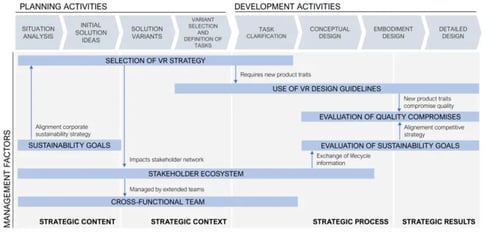Considering aspects of the circular economy right from the product design stage is the most effective approach a company can take to improve the sustainability and circularity performance of its products. A recent study by the Christian Doppler Laboratory for Sustainable Product Management enabling a Circular Economy, co-funded by iPoint-systems, investigated the managerial factors necessary for implementing circular economy strategies during product development as well as designated conditions under which they arise.
From circular strategy formulation to product development
The study empirically identified six main management factors influencing circular product design strategies via expert interviews with 24 circular economy forerunner companies. The six management factors and their interactions are illustrated (by blue bars and arrows) in Figure 2.
As can be seen, the selection of a circular economy (or value retention – VR) strategy is guided by the definition of a corporate sustainability strategy. It is supported by situation analysis activities, such as portfolio analysis, product benchmarking, and forecasting. Success factors for initiating a circular product design process are an early start, i.e., during product planning, and a close alignment between product planning and product development because potential synergies and goal conflicts can be identified and addressed effectively. These requirements are especially important for short-loop circular economy strategies, such as “Reduce” or “Reuse” or “Repair”, since these are more likely to be interconnected with strategic organizational elements. The use of circular product design (VR) guidelines and evaluation tools, such as screening (S)LCAs and CE indicators, is the next management phase in the circular product design process, and it constitutes the transition from product planning to development. It is followed by an evaluation of how new design traits, working principles, and functionalities interact with product quality. This product evaluation phase is more elaborate than the initial selection of concepts in the planning phase. It requires decision-making support that covers a wide range of objectives (task-specific, requirements, constraints) and encompasses both the quantitative and qualitative product properties.
Early and continuous stakeholder engagement
Another essential management factor of circular product design refers to the required understanding of the external strategic context in which the product is embedded. The studied CE forerunners were found to continuously obtain and integrate stakeholder perspectives (e.g., from consumers, suppliers, competitors, governments, NGOs) throughout the product development process (i.e., from planning to embodied design). Such proactive involvement of direct and indirect stakeholders underlies the establishment of product ecosystems, which are essential value delivery enablers in a circular economy. As managing complex stakeholder ecosystems is beyond the scope and capabilities of most planning and development teams, the capabilities of different business units need to be integrated into development roadmaps whereby relevant tasks are allocated to the appropriate part of the team. The final of the six identified factors refers to managing those operational tasks unrelated to design within an extended cross-functional team. In addition to the traditionally interdisciplinary work during product development, the development of circular products furthermore requires at least sustainability-related, marketing, financial, stakeholder, and product management capabilities. Moreover, IT capabilities are also increasingly required, especially for realizing more far-reaching product service and/or data-driven circular value propositions.

Figure 2: Overview of management factors influencing circular product design emerging at different stages of product planning and development and their main interactions. VR = value retention (e.g., reduce, reuse, repair, remanufacture, recycle)
Circular competitive advantage
All in all, the multiple interdependencies observed across managerial factors (see the full paper) mean the integration of circular economy strategies involves a substantial investment of resources. Therefore, managers need to be engaged in conceptualizing circular products to seize their strategic value and overcome financial barriers, which are regarded as the biggest challenge to circular economy implementation. However, the competitive advantage gained by pursuing a circular economy strategy is likely to outweigh the barriers of a CE strategy in the long run (Prieto-Sandoval et al., 2019). One of the competitive advantages is the stronger business integration required to manage a wider range of internal and external teams stakeholder and is aligned with the potential of digitalization as an enabler of circularity (Antikainen et al., 2018).
Open access to the full study
This study was published in “Resources, Conservation and Recycling” and the full paper „Implementing circular economy strategies during product development“ by Anna Diaz, MSc, Prof. Dr. Tatiana Reyes, and Prof. Dr. Rupert J. Baumgartner can be read here:
https://doi.org/10.1016/j.resconrec.2022.106344
References
Antikainen, M., Uusitalo, T., Kivikyt ̈ o-Reponen, P., 2018. Digitalisation as an enabler of circular economy. Paper presented at the Procedia CIRP 73, 45–49. https://doi.org/ 10.1016/j.procir.2018.04.027.
Prieto-Sandoval, V., Jaca, C., Santos, J., Baumgartner, R.J., Ormazabal, M., 2019. Key strategies, resources, and capabilities for implementing circular economy in industrial small and medium enterprises. Corporate Soc. Responsibility and Environ. Manag. 26 (6), 1473–1484. https://doi.org/10.1002/csr.1761.






